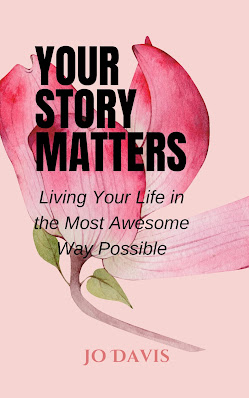Thank you all you readers. I appreciate you!
Chapter 30
Judgments
Yesterday, I was listening to an audio tape in which a woman asked for help with what she felt was her problem: judging people.
In many of the metaphysical circles I've attended, one central question is, "How can I get rid of judgments?"
You can't.
And why do you want to?
The person speaking on the tape was being bossed by her mother-in-law. I would expect her to be angry. But women aren't supposed to be angry.
No, it makes others uncomfortable.
Anger is a step up from depression. The lady on the tape needed to take back her power. It was her house. Her mother-in-law was a guest.
And, from the sound of it, her mother-in-law was a pain in the butt. We understand. Although we are looking in from the outside and do not have the emotional attachment that the lady did. It's easy for us. Isn't that what therapists and coaches do?
Supposedly, they are unbiased observers who can see what others, under the influence of adrenaline, or ego, cannot see. It was dis-empowering for the mother-in-law to live with her son and daughter-in-law, yet it was her daughter-in-law's house.
I am growing into the philosophy that we aren't broken and do not need fixed.
We need to grow.
You are a discerning person. You will judge.
How would you know if you wanted to befriend that person? How would you get the message that you should stay away from another? Did something tell you they were dangerous? How could you see that you are being manipulated and that being a doormat does not serve your magnificence?
Being made small in one's own home is not an option.
Do not wipe out your intuition under the guise that you are judging. Loving unconditionally is for yourself, to see yourself as whole and capable of judgments that serve you and others.
We notice what is right and what is wrong. We notice when justice is done, not injustice. We see when we are being stalked under the guise of love. There are many ways in which judgments are valuable.
Remember the children's story The Emperor Has No Clothes?" It took a child's discernment to say, "You guys are nuts; that Emperor is butt naked."
However, if you judge a person to be a certain way because they are different from you, black or white, male or female, child or adult, and you have categorized them before you know them, maybe you should think again. That is prejudice—to pre-judge without the facts.
Isn't a judge someone who decides to impartially resolve a dispute?
The impartial aspect—that's the rub.
All too often, when people judge, they look for faults that will make them feel superior.
"To find the medium takes some share of wit, and therefore 'tis a mark fools never hit." —William Cowper.
Once, I crawled the length of a football field, then back again, and my instructor was ready to ask for a return trip when someone intervened. I was supposed to have some sort of "Breakthrough," but to this day, I still don't know from what to what.
They wanted me to believe something I couldn't accept. And they couldn't force me into it. Stubbornness built in by my mother in trying to spank me into compliance.
I used to think self-growth had to be hard. And I admit that changing is. However, that unwritten law that we are broken and need to be fixed needs to go.
Growth is our desire, our natural right, and our heritage. When something stops growing, it becomes stagnant and dies.
Let's not do that.
Two Wrongs Don’t Make a Right
Women, stop this atrocity!
If the Republican party can't find a better candidate for the highest office in the land, one who respectively represents us to other countries, one who has the people's interest at heart instead of his own, they ought to be kicked to the curb and be overrun by the independents.
· Oh, it can get worse. The Republican nominee can choose a running mate that has supported a nationwide abortion ban and even criticized exceptions for rape and incest. The candidate said, "Two wrongs don't make a right."
· He has called Social Security and Medicare "the biggest roadblocks to real fiscal sanity."
· He said women should stay in violent marriages.
· He admits he wouldn't have certified the election results immediately on January 6 if he'd been vice president. He even said he's "skeptical" that Pence was in danger.
(I guess a gallows doesn't represent anything. And then we're surprised that we have shooters in America?)
And why is the US—the land of the free, home of the brave, afraid to have a woman as President?
The suffragettes fought to give us the right to vote. Ladies, it's time to stop supporting the errant child.
A mamma horse has enough sense to kick an errant foal out of the herd until he shapes up. A mare is the Matriarch of the herd, the one who runs the day-to-day living. The Stallion is the sentinel and the protector. A physically strong male passes on strong genes to his children.
· People should stop giving the center of attention to the errant child.
· (Remember women, The Trojan Women stopped the warring by refusing to sleep with their men until it stopped.)
· Stop listening to the Pundits 24/7.
·
Stop
giving the Republican Party money--oh it's the billionaires, Well, stop giving them your hard-earned money.
· Stop allowing the candidate and his cohorts to stack the deck in their favor and take away our rights as women.
Remember Franklin D. Roosevelt? He set America back on its feet again after the Depression, and he had help walking to the podium, as he wore steel leg braces because of infantile paralysis. However, the government wanted to present a strong president, so no pictures of him in a wheelchair were shown.
John F Kennedy said, "The one who governs best is the best governor." What a concept.
We revere Cleopatra—once a Pharaoh of Egypt (for 21 years), touted as a seductress, she was actually noted for her brains, highly educated, had great command of oratory, and an ability to speak seven or eight languages—thus a good negotiator.
Golda Meir, Prime Minister of Israel, 69-74: "There is only one thing I hope to see before I die and that is that my people should not need expressions of sympathy anymore."
Eva Peron, the first lady of Argentina, champion of the working class and the poor, won the nomination for VP after she was diagnosed with cancer. (She stepped down.)
Eleanor Roosevelt is ranked ninth on a list of the 18 most admired people of the 20th century. She was the first lady of the US and served as the US Delegate to the United Nations Assembly from 1945 to 1952. She had a leading role in designing the text and gaining international support for the Universal Declaration of Human Rights.
Old story, I've told this a few times:" Dr. Gabor Mate, MD, who treated people with addictions, believes that most addictions are caused by childhood trauma, even ones we weren't consciously aware of at the time.
Mata's mother called the pediatrician when Mate’ was an infant. "Little Gabor is crying all the time."
"All the babies are crying," responded the doctor. Germany was about to invade Poland, and the mothers were anxious. The babies were responding.
What are we doing to our people?



